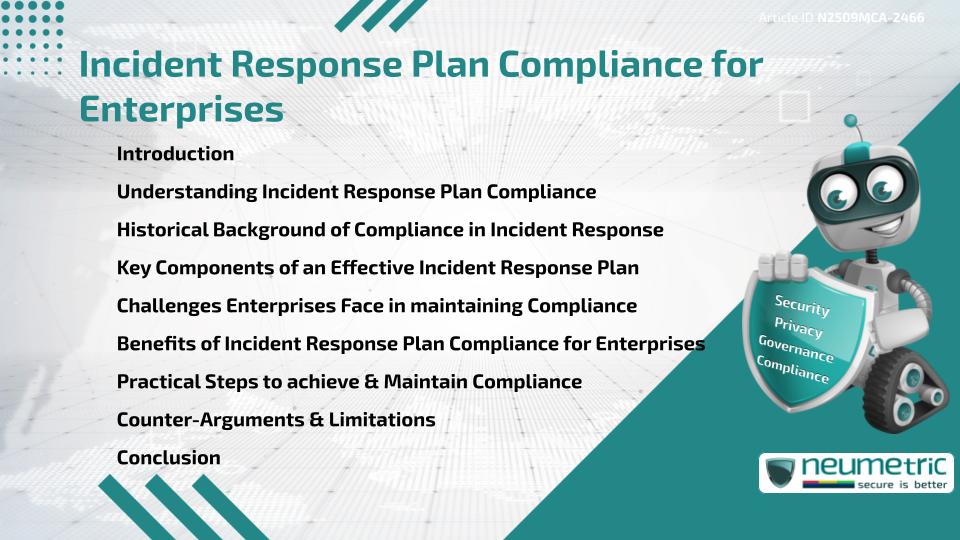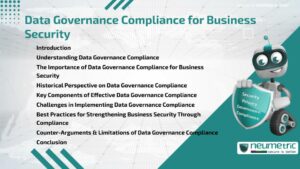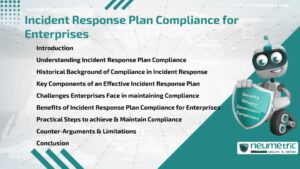Table of Contents
ToggleIntroduction
Incident Response Plan compliance is crucial for enterprises that aim to safeguard Sensitive Data, comply with regulations & minimise the damage caused by cyber incidents. It ensures that Organisations not only have a structured process to manage incidents but also meet the requirements of regulatory bodies. Compliance strengthens trust among Stakeholders & helps enterprises avoid penalties, reputation loss & operational disruptions.
Understanding Incident Response Plan Compliance
Incident Response Plan compliance refers to aligning an enterprise’s Incident Response procedures with Industry Regulations, standards & legal requirements. These may include frameworks such as ISO 27001, SOC 2, HIPAA & GDPR. Compliance requires enterprises to document, test & continuously update their Incident Response plans to demonstrate preparedness & accountability.
Historical Background of Compliance in Incident Response
In the early days of Cybersecurity, incident management was often reactive & ad hoc. With the rise of data breaches & evolving Threats, regulators introduced strict compliance mandates. Laws such as GDPR in Europe & HIPAA in the United States established clear requirements for incident reporting & management. Over time, industry frameworks also shaped Best Practices, making compliance an integral part of enterprise security programs.
Key Components of an Effective Incident Response Plan
An effective Incident Response Plan typically includes:
- Preparation: Establishing roles, responsibilities & tools.
- Identification: Detecting & verifying incidents quickly.
- Containment: Limiting the spread of Threats.
- Eradication: Removing malicious elements from systems.
- Recovery: Restoring normal operations securely.
- Lessons Learned: Reviewing incidents to improve processes.
Compliance requires each of these components to be clearly documented, tested & updated regularly.
Challenges Enterprises Face in maintaining Compliance
Enterprises often face challenges such as:
- Complex Regulations: Navigating overlapping Compliance Requirements.
- Resource Constraints: Allocating sufficient personnel & budget.
- Technology Gaps: Integrating tools for monitoring & reporting.
- Human Error: Ensuring consistent execution of procedures.
These challenges can hinder enterprises from fully achieving Incident Response Plan compliance, but proactive measures can reduce Risks.
Benefits of Incident Response Plan Compliance for Enterprises
Achieving compliance provides several benefits:
- Regulatory Assurance: Avoiding fines & penalties.
- Enhanced Security Posture: Reducing Vulnerability to attacks.
- Stakeholder Trust: Building confidence among Customers & partners.
- Operational Resilience: Minimizing downtime & disruptions.
Enterprises that demonstrate compliance also gain a competitive edge in industries where Data Protection is highly valued.
Practical Steps to achieve & Maintain Compliance
Enterprises can achieve & maintain compliance by:
- Conducting regular Risk Assessments.
- Training Employees on Incident Response protocols.
- Leveraging automation for faster detection & reporting.
- Documenting all activities & maintaining Audit trails.
- Partnering with external Auditors to validate compliance.
These steps not only ensure compliance but also improve overall organizational readiness.
Counter-Arguments & Limitations
Some argue that strict Compliance Requirements may lead to a checklist mentality, where enterprises focus only on meeting minimum standards instead of genuinely improving security. Others highlight the high costs of compliance, which may strain smaller Organisations. While these concerns are valid, a well-implemented Incident Response Plan compliance Framework balances regulatory obligations with real-world security effectiveness.
Conclusion
Incident Response Plan compliance is a vital part of enterprise security. It goes beyond regulatory requirements by fostering a culture of preparedness & accountability. Enterprises that embrace compliance are better positioned to handle Cyber Threats, protect Sensitive Data & maintain trust with Stakeholders.
Takeaways
- Incident Response Plan compliance is essential for enterprises to meet regulatory obligations.
- Compliance strengthens security, reduces Risk & enhances Stakeholder trust.
- Challenges exist but can be mitigated through training, documentation & automation.
- A balanced approach ensures both compliance & practical security benefits.
FAQ
What is Incident Response Plan compliance?
Incident Response Plan compliance is the process of ensuring that an enterprise’s Incident Response procedures meet regulatory & Industry Standards.
Why is Incident Response Plan compliance important for enterprises?
It helps enterprises reduce Risks, avoid legal penalties & strengthen trust with Stakeholders.
Which regulations influence Incident Response Plan compliance?
Regulations such as GDPR, HIPAA, SOC 2 & ISO 27001 directly impact Compliance Requirements.
What are the key components of an Incident Response Plan?
Preparation, identification, containment, eradication, recovery & lessons learned are the core components.
How can enterprises maintain compliance effectively?
They can maintain compliance by conducting regular assessments, training Employees, documenting activities & leveraging automation.
What challenges do enterprises face in compliance?
They often face complex regulations, resource constraints, technology gaps & Risks of human error.
Does compliance guarantee complete security?
No, compliance does not guarantee complete security, but it significantly improves an enterprise’s preparedness & resilience.
Need help for Security, Privacy, Governance & VAPT?
Neumetric provides organisations the necessary help to achieve their Cybersecurity, Compliance, Governance, Privacy, Certifications & Pentesting needs.
Organisations & Businesses, specifically those which provide SaaS & AI Solutions in the Fintech, BFSI & other regulated sectors, usually need a Cybersecurity Partner for meeting & maintaining the ongoing Security & Privacy needs & requirements of their Enterprise Clients & Privacy conscious Customers.
SOC 2, ISO 27001, ISO 42001, NIST, HIPAA, HECVAT, EU GDPR are some of the Frameworks that are served by Fusion – a SaaS, multimodular, multitenant, centralised, automated, Cybersecurity & Compliance Management system.
Neumetric also provides Expert Services for technical security which covers VAPT for Web Applications, APIs, iOS & Android Mobile Apps, Security Testing for AWS & other Cloud Environments & Cloud Infrastructure & other similar scopes.
Reach out to us by Email or filling out the Contact Form…





